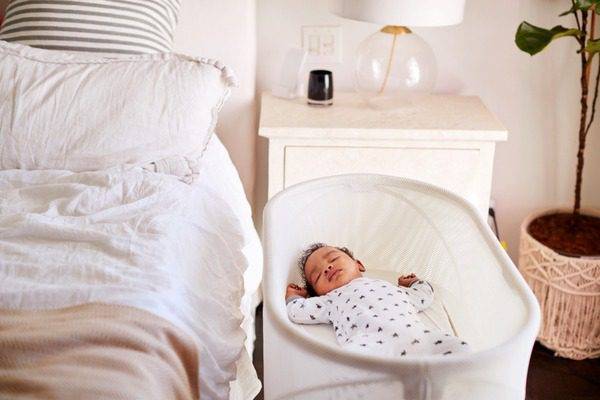The sleep shock (or lack thereof) that can come from the puzzle of newborn sleep can be real. By this time, we’re sent home from the hospital with directions for feeding, bathing, and hygiene care, but what about sleep?
3 common sleep challenges during the newborn phase:
- Unable to put the baby down in a bassinet or crib for naps or nighttime
- Naps last only 20-30 minutes at a time
- Newborn is sleeping all day and partying all night (called “day and night confusion”)
5 Tips to Help Your Newborn Sleep
Follow these top 5 newborn sleep hacks to overcome the top newborn sleep challenges:
1. Create a Sleep Friendly Room
Set up a sleep space with brown noise (low-frequency noise) and a dark room to help your newborn feel better acclimated to the sleep space as they develop their circadian rhythm.
Contrary to popular belief, newborns do not get ‘used’ to sleeping in a dark room versus a light room. We are hardwired with survival instincts to react to light, releasing cortisol (the stress hormone). In addition, keeping a sleep space nice and dark helps promote a newborn’s release of melatonin (the sleepy hormone). A good sleep environment can be the difference between a short and long nap!
2. Keep wake times nice and bright
While we want nice, cool, dark environments to help promote sleep during naptimes and bedtime, we want a lot of natural light to help keep our sleepy newborns awake during the daytime. They can be very sleepy, making it hard for them to stay awake longer than a few minutes, which sometimes leads to day and night confusion. Newborns have general thresholds of about 16-18 hours of daily sleep.
Introducing natural light during the day, and keeping your newborn awake 30-45 minutes at a time will help remedy this sleep obstacle.
3. Use the bassinet for nap time
Practice putting your newborn down for naps in a bassinet, a pack-n-play, or a crib for at least 1-2 naps a day.
Newborns will get quickly acclimated to their sleep environment the more they are exposed to these spaces. In addition, the more practice a newborn gets in this type of sleep space, the more likely they are to feel comfortable with this at night.
4. Use the 10 minutes, Feet first rule
So often, families struggle with the newborn crying as soon as the baby is put in a crib. This can make for tricky nap time when a parent cannot move or leave the nursery until the nap is over. Waiting 10 minutes into the nap allows the newborn enough time to dive into a deep stage of sleep. Combining that hack with putting newborns down feet first instead of whole-body first also helps with startling!
5. Keep a schedule without keeping a schedule.
What does that even mean? Newborn sleep can be unpredictable, making it almost impossible to create a schedule. However, there is a way to create a tremendous newborn schedule that promotes predictability, consistency, and flexibility that can also encourage better day and night sleep.
This approach aims to implement a schedule and routine hybrid. First, observe when your child typically wakes in the morning. Then, use that natural wake-up time to drive the rest of your day consistently because of your ‘desired wake-up time.’ Your first nap of the day can start about 45 minutes from that ‘desired wake-up time’ instead of the actual wake-up time. All other naps will be every 30-45 minutes. Once you hit close to the end of the day, you will end your last rest 45 minutes before bedtime (no matter what time your newborn fell asleep). And voila! You have a consistent schedule that still allows you to follow your newborn’s sleepy cues.
These are my favorite newborn tips as a Pediatric Sleep Expert! Did I miss any? What favorite newborn hacks do you have?
Join Mica on Friday, April 22 at the Virtual Baby Expo to ask questions and learn more baby sleep tips! Register here for your free.



